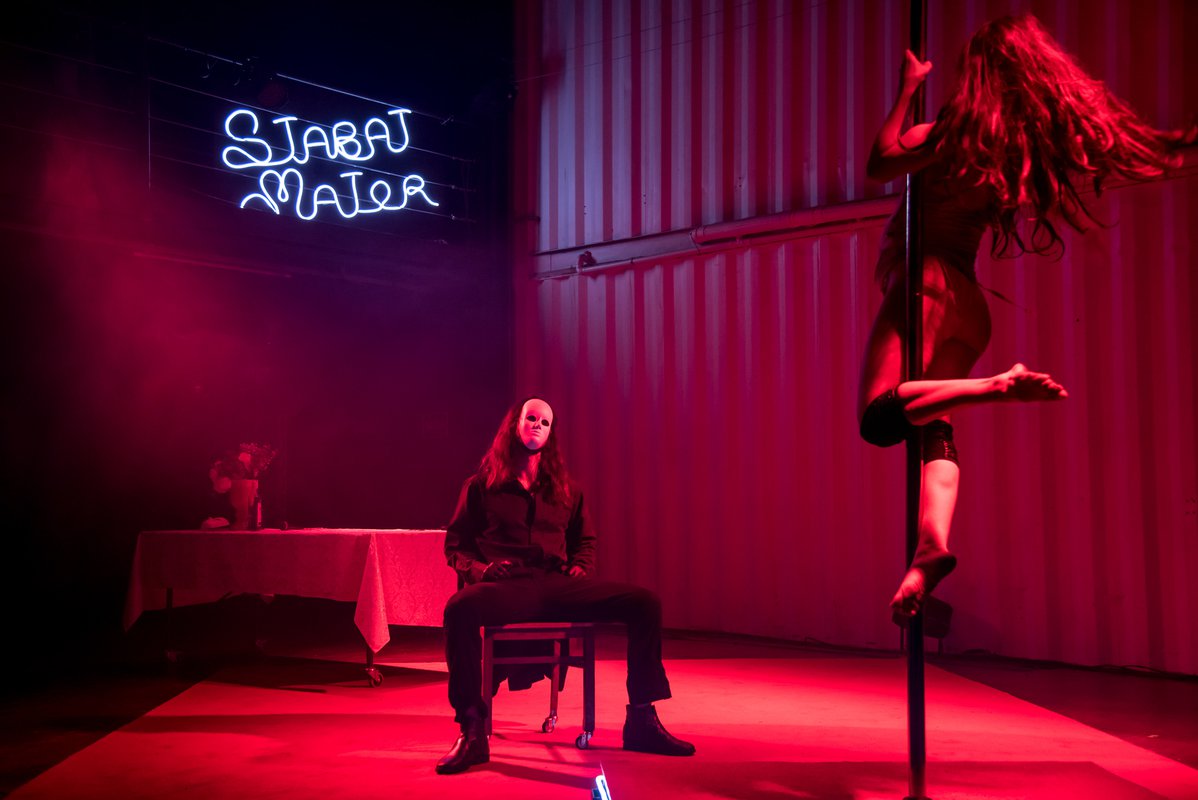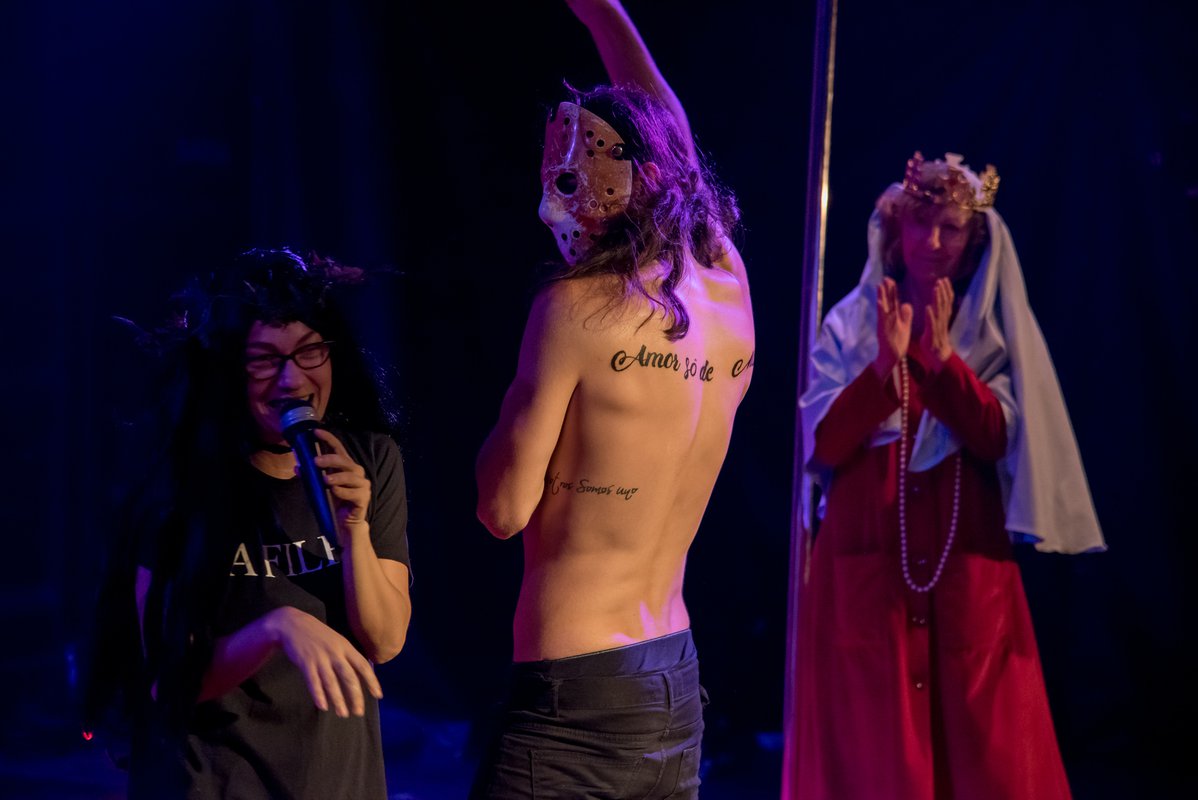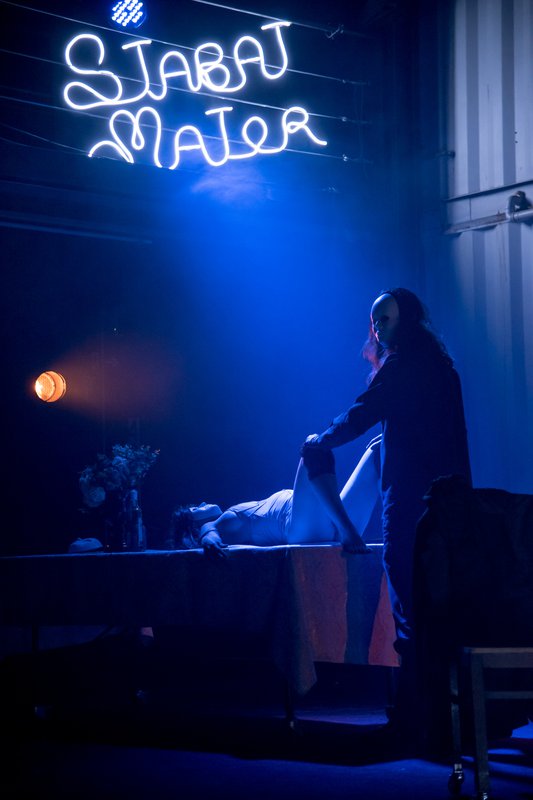Performance | Theatre
Conceived, directed and written by: Janaina Leite | Performance: Janaina Leite, Amália Fontes Leite and Príapo | Special guest: Lucas Asseituno (amateur Príapo) and Loupan (professional Príapo) | Dramaturgy and assistant directors: Lara Duarte and Ramilla Souza | Dramaturgical collaboration: Lillah Halla | Art director, staging and costumes: Melina Schleder | Lighting: Paula Hemsi | Video installation and editing: Laíza Dantas | Sound: Lana Scott | Production director: Carla Estefan | Lighting: Nara Zocher | Vocal preparation: Flavia Maria | General assistant: Luiza Moreira Salles | Idea and audiovisual script: Janaina Leite and Lillah Halla | Photography director: Wilssa Esser | Video participation: Alex Ferraz, Hisak, Jota, Kaka Boy, Mike and Samuray Farias | Visual identity and projections: Juliana Piesco | Photography and video records: André Cherri | International promotion: Metropolitana Gestão Cultural.
Janaina Leite
Director
Biographical creator
A Brazilian actress, director and playwright, she’s one of the founders of the award-winning Grupo XIX from the Theater of Sao Paulo. As well as her career with this group, she has come up with the shows Festa de Separação: um documentário cênico, Conversas com meu pai and Stabat Mater and published the book Autoescritura performativa: del diario a la escena de Perspectiva, consolidating her research on documentary autobiography in the theater. She also holds workshops, labs and conferences around the world. Among the latter, her talks at the Paris Conservatory, at the Sorbonne Nouvelle - Paris 3 University, at the School of Music and Performing Arts in Porto and at the Lisbon Theater and Film School particularly stand out.
“In Stabat Mater, masculine violence against the female emerges as an issue. Its performance-art nature lets actress and researcher Janaina Leite expose the body to extreme situations”.
—TeatroJornal, Brazil.
—It brings together performance, visual and verbal biographical testimonies and gender issues. Its hybrid staging makes us question a topic that isn’t that easy to digest: the construction of the feminine ‘ideal’ of purity and sacrifice as a result of the image of the Virgen Mary, the woman who gave birth ‘without pleasure and without sin’, impregnated while she slept. To reflect on this, Janaina Leite uses every dramatic and narrative resource available.
—Although testimonial or autobiographical theater is a tendency that is quite widespread, Leite doubles down by bringing her own mother, Amália, to the stage, as well as a porn actor nicknamed Príapo. He’s named after the Greco-Roman god of fertility: a coarse character who, in an instant, is at the beck and call of the women on stage.
—It’s a moving experience for the women in the audience, who end up writing about experiences that have changed their lives. “I’m really touched by the messages I receive, the accounts, the dreams. It’s a piece with really strong repercussions”, said the director in an interview with MITsp (the Sao Paolo International Theater Event).
Julia Kristeva: A French philosopher, psychoanalyst and writer of Bulgarian origin, she’s a literature and feminism theorist and has been one of the most outstanding figures in French cultural circles since the sixties as a role model for feminism. Her highly complex work involves critiquing structuralism and she’s influenced by Roland Barthes, Michel Foucault and, above all, Jacques Lacan. Among her plays, El texto de la novela (1970), Historia de amor (1987) and Trabajo de la metáfora (1985) stand out. Stabat Mater was originally an essay published in the magazine Tel Quel in 1977. In it, she combines academic research on the cult of the Virgin Mary with a personal story about the bodily and mental experiences surrounding the birth of her son.
Performance: An avant-garde art form in which the play’s medium is the artist’s body and the play itself is made up of the actions this carries out, normally combined with multiple other elements such as the visual arts, music, dance and theater. It’s one of the art forms that transformed art in the middle of the twentieth century.
—Listen to Janaina Leite’s interview with Canal Arte 1 about the play (in Portuguese).
—Listen to the conversation between Julia Kristeva and Chilean anthropologist Sonia Montecino at Puerto de Ideas 2011.
On Instagram, @espetaculostabatmater , @metrogestaocultural
Web site, metrogestaocultural.com , www.janainaleite.com
PRESENTA

COLABORA

Stabat Mater
By Janaina Leite
- Brazil
- Spanish
- 110 minutes
- + 18 years
A Brazilian theater director, her mother and a porn star talk about the cultural prototypes of ‘being a woman’ and maternity, in a performance as undefinable as it is acclaimed.
Brazilian artist Janaina Leite holds a casting with several porn stars. She asks them all the same question: “Would you star in sex scene with me, directed by my mother?”. None of them have any problem with this, although none of them think this is any old job, because the object of desire isn’t going to be the woman but the man. In addition, it’s going to be directed by a woman, completely opposite to what normally happens in the porn industry.
In Stabat Mater (which could be translated as ‘Where the mother was’), Janaina Leite (‘the daughter’), her mother (‘the mother’) and the chosen porn star (‘the professional’) are part of a conference-performance in which female representation, maternity and sexuality are discussed. Based on the text by philosopher and psychoanalyst Julia Kristeva, the piece does more than just tackle the experience of being a mother and is much, much more than just talking about porn. It goes back to the roots of the historical arrangement between male and female, daring to confront both the happiness and pain that these positions entail.
Stabat Mater was chosen as the Best Premiere of 2019 by critics from the Folha and O Estado newspapers in São Paulo and also won the Shell award in the dramaturgy category.
Stabat Mater
By Janaina Leite
- Brazil
- Spanish
- 110 minutes
- + 18 years
A Brazilian theater director, her mother and a porn star talk about the cultural prototypes of ‘being a woman’ and maternity, in a performance as undefinable as it is acclaimed.
Brazilian artist Janaina Leite holds a casting with several porn stars. She asks them all the same question: “Would you star in sex scene with me, directed by my mother?”. None of them have any problem with this, although none of them think this is any old job, because the object of desire isn’t going to be the woman but the man. In addition, it’s going to be directed by a woman, completely opposite to what normally happens in the porn industry.
In Stabat Mater (which could be translated as ‘Where the mother was’), Janaina Leite (‘the daughter’), her mother (‘the mother’) and the chosen porn star (‘the professional’) are part of a conference-performance in which female representation, maternity and sexuality are discussed. Based on the text by philosopher and psychoanalyst Julia Kristeva, the piece does more than just tackle the experience of being a mother and is much, much more than just talking about porn. It goes back to the roots of the historical arrangement between male and female, daring to confront both the happiness and pain that these positions entail.
Stabat Mater was chosen as the Best Premiere of 2019 by critics from the Folha and O Estado newspapers in São Paulo and also won the Shell award in the dramaturgy category.
Conceived, directed and written by: Janaina Leite | Performance: Janaina Leite, Amália Fontes Leite and Príapo | Special guest: Lucas Asseituno (amateur Príapo) and Loupan (professional Príapo) | Dramaturgy and assistant directors: Lara Duarte and Ramilla Souza | Dramaturgical collaboration: Lillah Halla | Art director, staging and costumes: Melina Schleder | Lighting: Paula Hemsi | Video installation and editing: Laíza Dantas | Sound: Lana Scott | Production director: Carla Estefan | Lighting: Nara Zocher | Vocal preparation: Flavia Maria | General assistant: Luiza Moreira Salles | Idea and audiovisual script: Janaina Leite and Lillah Halla | Photography director: Wilssa Esser | Video participation: Alex Ferraz, Hisak, Jota, Kaka Boy, Mike and Samuray Farias | Visual identity and projections: Juliana Piesco | Photography and video records: André Cherri | International promotion: Metropolitana Gestão Cultural.
Janaina Leite
Director
Biographical creator
A Brazilian actress, director and playwright, she’s one of the founders of the award-winning Grupo XIX from the Theater of Sao Paulo. As well as her career with this group, she has come up with the shows Festa de Separação: um documentário cênico, Conversas com meu pai and Stabat Mater and published the book Autoescritura performativa: del diario a la escena de Perspectiva, consolidating her research on documentary autobiography in the theater. She also holds workshops, labs and conferences around the world. Among the latter, her talks at the Paris Conservatory, at the Sorbonne Nouvelle - Paris 3 University, at the School of Music and Performing Arts in Porto and at the Lisbon Theater and Film School particularly stand out.
“In Stabat Mater, masculine violence against the female emerges as an issue. Its performance-art nature lets actress and researcher Janaina Leite expose the body to extreme situations”.
—TeatroJornal, Brazil.
—It brings together performance, visual and verbal biographical testimonies and gender issues. Its hybrid staging makes us question a topic that isn’t that easy to digest: the construction of the feminine ‘ideal’ of purity and sacrifice as a result of the image of the Virgen Mary, the woman who gave birth ‘without pleasure and without sin’, impregnated while she slept. To reflect on this, Janaina Leite uses every dramatic and narrative resource available.
—Although testimonial or autobiographical theater is a tendency that is quite widespread, Leite doubles down by bringing her own mother, Amália, to the stage, as well as a porn actor nicknamed Príapo. He’s named after the Greco-Roman god of fertility: a coarse character who, in an instant, is at the beck and call of the women on stage.
—It’s a moving experience for the women in the audience, who end up writing about experiences that have changed their lives. “I’m really touched by the messages I receive, the accounts, the dreams. It’s a piece with really strong repercussions”, said the director in an interview with MITsp (the Sao Paolo International Theater Event).
Julia Kristeva: A French philosopher, psychoanalyst and writer of Bulgarian origin, she’s a literature and feminism theorist and has been one of the most outstanding figures in French cultural circles since the sixties as a role model for feminism. Her highly complex work involves critiquing structuralism and she’s influenced by Roland Barthes, Michel Foucault and, above all, Jacques Lacan. Among her plays, El texto de la novela (1970), Historia de amor (1987) and Trabajo de la metáfora (1985) stand out. Stabat Mater was originally an essay published in the magazine Tel Quel in 1977. In it, she combines academic research on the cult of the Virgin Mary with a personal story about the bodily and mental experiences surrounding the birth of her son.
Performance: An avant-garde art form in which the play’s medium is the artist’s body and the play itself is made up of the actions this carries out, normally combined with multiple other elements such as the visual arts, music, dance and theater. It’s one of the art forms that transformed art in the middle of the twentieth century.
—Listen to Janaina Leite’s interview with Canal Arte 1 about the play (in Portuguese).
—Listen to the conversation between Julia Kristeva and Chilean anthropologist Sonia Montecino at Puerto de Ideas 2011.
On Instagram, @espetaculostabatmater , @metrogestaocultural
Web site, metrogestaocultural.com , www.janainaleite.com
PRESENTA

COLABORA



